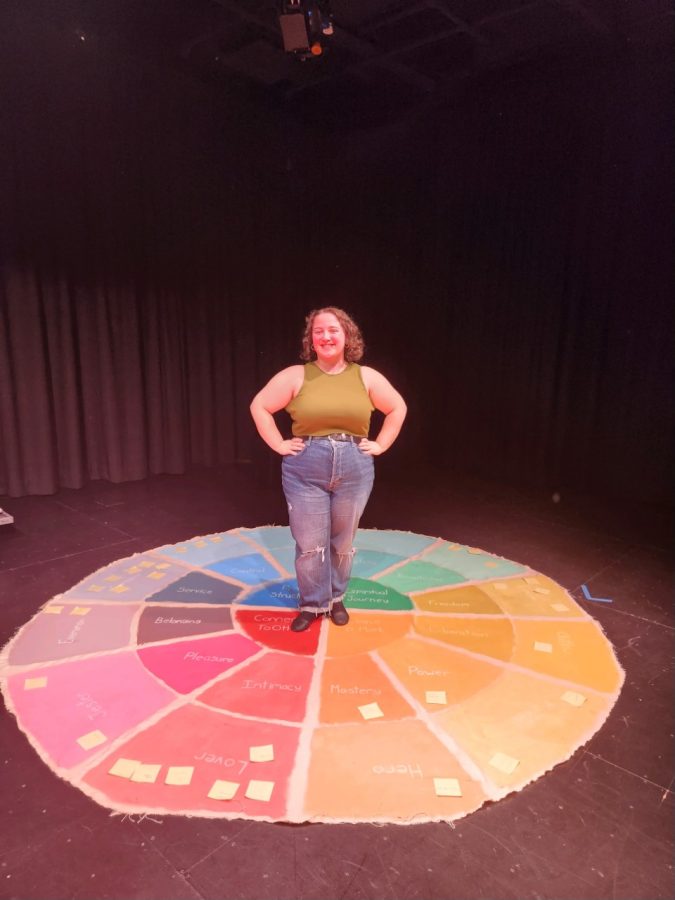Kiana Carbone’s “Branch of a Tree”
Kiana Carbone presented her performance “Branch of a Tree in the Garey Hall Black Box Studio.
March 1, 2023
On February 22 and 23, at 5:00 p.m. and 6:00 p.m., the Performance Studies Area in the Communication Department presented its third show of the Spring 2023 season: “Branch of a Tree.” Nearly 100 audience members gathered in the Garey Hall Black Box Studio to see the performance. The show was written by senior communication major Kiana Carbone and co-directed by Cammie Norman with Assistant Director Dr. Evan Schares, Assistant Professor and Coordinator of the Performance Studies Area.
Carbone’s performance was centered around archetypes. According to Carbone’s director notes, the archetype is “the original model that can be copied endlessly: in literature, in film, on the stage and in each individual person.” In the show, which is Carbone’s senior project for the major, she explores the relationship between her own archetypes and her life experiences.
A key feature of the performance was a painted “archetypal wheel,” located on the ground center stage. The wheel is an interpretive tool that lists each of the 12 archetypes (The Innocent, Everyman, Hero, Outlaw, Explorer, Creator, Ruler, Magician, Lover, Caregiver, Jester and Sage). When audience members first entered the studio, they were invited to write their favorite superhero on a Post-It Note. They then had to place their note on the section of the wheel they felt they most aligned with.
Throughout the performance, Carbone moved around this wheel as she explored each of her own archetypes and how they inform how she interacts with herself, others and the world. She explains that she sees her archetypes and herself like a giant tree — her roots are the experiences she’s had that cannot be changed, she herself is the trunk, the branches are her archetypes and the roles she plays on stage and in life are the leaves, which “have nowhere to go and no depth behind them without the archetype.” In her performance, she becomes this tree as she tells the audience that “discovering what [her] archetypes are was like watching a tree grow from a small sapling to a lumbering being with leaves and flowers and fruit.”
The Villanovan spoke with Carbone to learn more about how and why she decided to create this production.
“I decided to do a performance for my senior project, as I felt that portraying something that is so deeply ingrained in literature and art, like archetypes that a performance would be the best way to convey that,” Carbone said. “Also, having so much experience in theater and the performing arts I felt that the culmination of my education would be best shown on a stage. There is also something that people get from audience art that they do not get from just reading words on a page. I could have just shared my personal findings in the form of a paper, but having the words be embodied through my voice and movement brings another level of intimacy to the words, and connection to the audience.”
Carbone has been studying archetypes for the last seven years with a theater teacher of hers. Because of this, she wanted to utilize the knowledge that everything we do will mean something to someone to the stage. When asked what her favorite part of the process was, Carbone chose the writing.
“I have performed on stage, made set pieces and done just about anything you can do to put on a performance before, but writing something of this length was completely new to me,” Carbone said. “Having the chance to write something that was a significant length, and completely me was exciting, also very helpful with how introspective this piece was it allowed me to really put my thoughts into words.”
Carbone hopes to one day work professionally in show business, as well as teach in a college setting. While her future with performance won’t involve being on stage, she assures that she won’t be leaving the world of performing arts any time soon. After her graduation in May, she hopes to pursue an MFA in Stage Management or Production Management.


